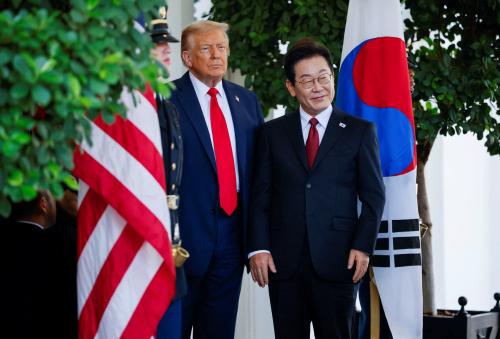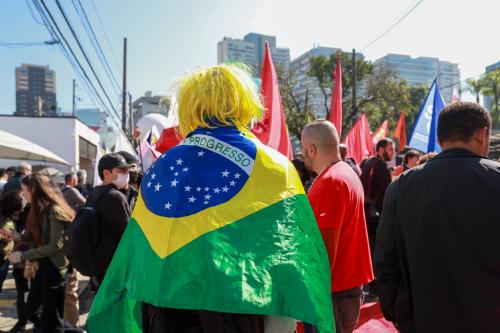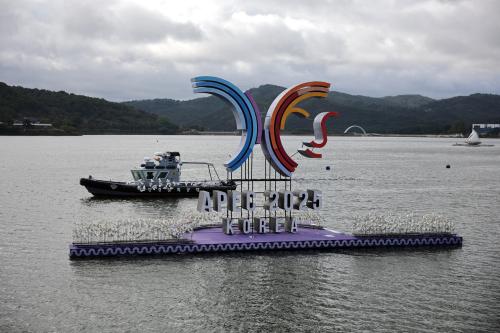Content from the Brookings Doha Center is now archived. In September 2021, after 14 years of impactful partnership, Brookings and the Brookings Doha Center announced that they were ending their affiliation. The Brookings Doha Center is now the Middle East Council on Global Affairs, a separate public policy institution based in Qatar.
Editors’ note: This blog post is adapted from a longer article published in The Diplomat. Kadira Pethiyagoda argues that strategic small states—such as Sri Lanka—now have more options in their alliances with regional or global powers. Those powers, in turn, shouldn’t take small states for granted.
Sri Lanka occupied little thought throughout the West for much of the period since independence in 1948. In the last few years, however, Sri Lanka began to feature as a country of strategic relevance to great powers, particularly China and the United States. Sitting at the center of the Indian Ocean, halfway between China and the key energy resources in the Middle East, Beijing has sought to influence politics on the island. But it has suffered blows this year, with Mahinda Rajapaksa (friendly to Chinese interests) losing the presidency in January and his party losing in recent parliamentary elections to the center-right United National Party. Now, pro-Western Ranil Wickramasinghe holds the position of prime minister.
But Western policymakers should not take the island state for granted. The larger lesson of Colombo’s shift to the West is that strategic small states like Sri Lanka now have more options and can easily switch sponsors.
Newly found interest
In May, John Kerry became the first secretary of state to visit Colombo in over a decade. There have been reports in Sri Lankan media that President Barack Obama has also promised to visit, something more likely given Wickramasinghe’s victory.
This newfound interest in the island is related to a “first-tier” security challenge for the United States: China. Rajapaksa’s government fell out of favor with Western governments for its activities during the Sri Lankan civil war. Citing non-implementation of good governance regulations, the European Union removed preferential tariff rates for Sri Lanka’s exports, causing thousands of garment factory workers to lose their jobs. Western countries supported war crimes investigations at the U.N. India, under pressure from Tamil Nadu state political parties, denied lethal weaponry to Colombo during the war and leaned on Sri Lanka to concede more legislative autonomy to Tamil-dominated provinces afterwards.
Unlike in previous decades, however, Colombo had an alternative great power to look to for military technology and investment. Beijing obliged, using its veto—alongside Russia—to defend Sri Lanka at the U.N. Sri Lanka was included as part of a chain of infrastructure projects along China’s “One Belt, One Road” initiative.
The American and European stand sparked a strong anti-Western public reaction in Sri Lanka, underpinned by existing suspicions of Western support for the Liberation Tigers of Tamil Eelam (LTTE) and anti-colonial and Cold War sentiment.
This January, however, Sri Lanka took a 180-degree foreign policy turn. The new president, Maithripala Sirisena, reached out to the West, began governance reforms and signaled a less nationalist approach to Tamil concerns. Sirisena’s first foreign visit was to New Delhi and Indian Prime Minister Narendra Modi repaid the gesture.
Strategic importance
Washington, Delhi, and Beijing have good reason to take an interest. Sri Lanka is at the heart of the world’s busiest sea lanes (more than 80 percent of global seaborne oil trade transits through the Indian Ocean.) The island sits in a region that will form the center of future world politics, strategy, and economics.
Middle Eastern governments have probably noticed Sri Lanka’s maneuvering between China and the West. Given the recent steps by Gulf States, in particular, to diversify their security partners, they may learn from Sri Lanka’s example of extracting the most from established and rising powers.
Washington, Delhi, and Beijing have good reason to take an interest [in Sri Lanka].
Sri Lanka’s own history of battling non-state actors may also provide lessons for Middle Eastern states facing similar challenges. Some of those states feel hamstrung by the West’s lack of support for (or outright opposition to) their own conflicts with non-state actors. But Colombo accomplished something that no great power—nor any Middle Eastern country including Israel—was able to. It comprehensively defeated one of the world’s most powerful terrorist armies.
The swinging pendulum
The August parliamentary elections were more significant than previous ones because of the new powers bestowed on the prime minister. Rajapaksa, leading the center-left United People’s Freedom Alliance, lost by a small margin to the most pro-West, pro-free market politician the country has seen in the last two decades. Ranil Wickramasinghe’s support for war crimes investigations against Rajapaksa had compounded his earlier unpopularity for concessions to the LTTE and Tamil majority areas. His party’s recent success owes not to national security or foreign policy issues, but to a fear of corruption and abuse of power under Rajapaksa (who offered the same ministerial team as in his previous government).
The election results are not a cause for Western complacency. Major moves by Wickramasinghe, either toward neoliberal economic policies or an “appeasing” foreign policy may result in a swing back to the opposition at the next election.
Sri Lanka’s changes of government will not overturn economic anchors like the fact that Colombo’s biggest export markets are the United States and Europe. But they will have significant impacts on Colombo’s geopolitical alignment. If Rajapaksa’s United People’s Freedom Alliance wins in the next election, major Chinese projects that Sirisena’s government halted may be recommenced. It may also have to revisit the Sirisena government’s threat to bar Chinese submarines from docking in Sri Lankan ports.
In that scenario, Beijing will have learned its lesson from Sri Lanka: that spending billions on investment in potential friends is sometimes less useful than spending millions, or even thousands, on gaining some insight and influence into the country’s domestic politics. During Rajapaksa’s decade in power, the Chinese made some strategic investments that would be difficult for any government to dislodge.
Even if the direct strategic benefits to China of having a pro-Beijing government in Colombo are minimal, the perception matters. Countries throughout Asia and the Middle East are re-evaluating their great power relationships. If states perceive Beijing’s strategic reach to be increasing, it may tip their calculations toward acquiescing rather than resisting when it comes to Beijing’s pressure on anything from economic and military relations to territorial claims. They may lose trust in the United States’ will and ability to commit to security in their regions.
The risks of unfriending
Sri Lanka provides an important lesson for Washington policymakers. A small country’s very symbolic switching of great power friends following changes of government is something not seen in the region since the Cold War.
The “geopolitical vacation” of the post-Cold War era is over. Traditional spheres of influence of regional powers like India are no longer sacrosanct. In the future, small states, particularly with strategic relevance like those around the Indian Ocean and the Middle East, will have more options to switch between multiple poles. Great powers will have less leverage.
Furthermore, increasing access to information means countries’ longstanding images can be rapidly altered. Sri Lankans’ approval of America’s world leadership fell from 36 percent at the end of the war in 2009 to just 14 percent in 2012. Anti-Western sentiment has made being pro-Western more of an electoral liability for politicians than an asset. Rajapaksa supporters evidently saw political gain in alleging that the U.S. CIA and British MI6 assisted his opponents.
In the future, small states…will have more options to switch between multiple poles.
The return of high stakes geopolitics means that the United States needs to work harder to win over small states, both governments and populations. This is particularly true for states which are geographically further from China and face little threat from it, those who feel the status quo has not served their security interests, and those with postcolonial sentiments. Sri Lanka fits all these categories, as do many Middle Eastern states.
Washington should dilute the influence of domestic lobbies (whether they be for foreign governments or specific interest groups), whose agendas are not always in line with U.S. national interest or values. There is also too much lag time between when intelligence and strategic analysts determine that a foreign country’s is of particular strategic importance and when high-level policymakers really change their approach.
Sri Lanka’s example provides a glimpse of small power-great power relations in a future multipolar world order. Obama’s and Kerry’s recent reassuring gestures to Gulf States suggest that the United States may now be recognizing the need to be more attentive to the interests of previously taken-for-granted countries, lest they fall into Beijing’s waiting arms.
The Brookings Institution is committed to quality, independence, and impact.
We are supported by a diverse array of funders. In line with our values and policies, each Brookings publication represents the sole views of its author(s).




Commentary
Why small states matter in international politics: The case of Sri Lanka
September 3, 2015